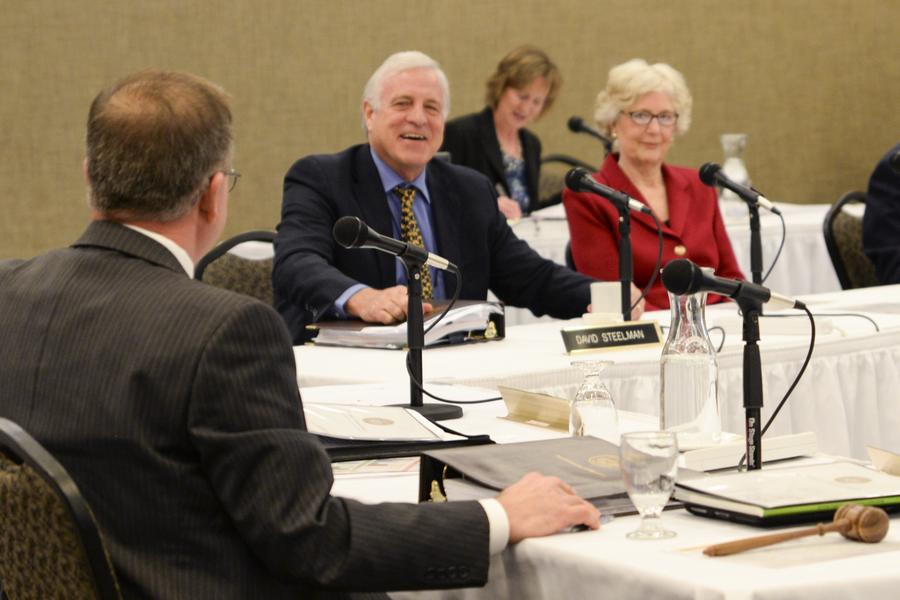
Several increases to MU’s student tuition and supplemental fees were approved by the UM System Board of Curators during its meeting at MU on Thursday.
####Tuition increases
Nonresident undergraduates will see a larger increase in their tuition rate. The 3 percent increase, approved in a 6-1 vote, will see per credit hour tuition raised by $23.20 to $798.10. For the academic year, nonresident tuition will cost an additional $696.
Resident undergraduate tuition will increase by 0.8 percent in 2016. The new tuition will charge in-state students $276.20 per credit hour and $8,286 for the academic year, an increase of $2.20 per credit hour, which amounts to $66 a year.
The increases in tuition across the UM System will yield $8.6 million, UM System President Tim Wolfe said. He said the schools need the money to keep up with increases in the Consumer Price Index. [Under the Higher Education Student Funding Act](http://dhe.mo.gov/policies/hesfaimp.php), the board cannot raise undergraduate resident tuition in excess of the change in CPI without a waiver from the Commissioner of Higher Education.
David Steelman, a curator from Rolla, was the only member of the board to vote against the tuition increases. He said he doesn’t believe the 3 percent increase for nonresidents addresses the most vital issue surrounding tuition.
The state of Missouri is one the easiest places in the nation to establish residency, Steelman said. He lamented the degradation of public universities in Missouri, which he blamed on out-of-state students who quickly receive resident status by living in the state for nine consecutive months.
“We are one of the easiest major public research institutions in the nation for nonresidents to become residents (and) we need to limit this,” Steelman said. “We have to show gratitude to the residents of the state of Missouri.”
John Phillips, curator from Kansas City, agreed the residency process was oversimplified, and expressed concern over what he called the “privatization” of higher education in Missouri.
Phillips decried the lack of state funding the UM System has received in recent years. He said he is worried some Missouri legislators no longer prioritize affordable and accessible public higher education.
“I hope that (legislators) will understand the box that higher education in Missouri is being put in,” Phillips said. “We’re getting away from it, and it is blurring. We are now more private than we are public, and that’s not American.”
####Supplemental fee increases
The board also approved increases and the creation of new supplemental fees that apply to certain colleges and schools, in a 7-0 vote.
The largest supplemental course fee increase at MU is for the Sinclair School of Nursing, where undergraduates will have to pay $90 per credit hour, a $20 per credit hour increase from last year.
The funds from the fee increase will be used to enhance faculty salaries in order to retain current faculty and attract new members. The school hopes to address issues regarding its faculty-to-student ratio by hiring more faculty with the new funds. The money will also be used to maintain the Essig Clinical Simulation Learning Center.
The Trulaske College of Business will increase its course fee rate by $7 for undergraduates and $8 for graduates per credit hour. According to meeting documents, the college will use the additional revenue to remain competitive in hiring capable faculty.
The school also plans to use the money to improve scholarly output and faculty-to-student ratio, which are both currently below accreditation standards used by the Association to Advance Collegiate Schools of Business.
Fees for the College of Arts and Science will increase from $25 to $30 per credit hour. During a [January 15 meeting of the curators](https://www.themaneater.com/stories/2015/1/15/curators-discuss-supplemental-fee-increases/), Arts and Science Dean Michael O’Brien said the funds will be used to expand initaitves like upgrading teaching labs and studios, enhancing faculty salaries and increasing study abroad and experiential learning opportunities in the college.
[According to the proposal documents](https://board.um.umsystem.edu/January%2015%202015%20Board%20of%20Curators%20Special%20Meeting/5%20FIN%20Info%201-1-9%20Supplemental%20Fees.pdf), the college plans to increase the fee to $40 per credit hour over the next few years.
####Students’ perspective
[Tracy Mulderig, the student representative to the board](https://www.themaneater.com/stories/2015/1/28/asum-continues-lobbying-legislators-student-curato/), raised two major concerns with the current pricing policy.
Mulderig said that she was concerned with the rising price of course fees across all of the campuses in the UM System. She said that she wanted the board to consider the fact that raising a course fee on one campus may encourage other campuses to do the same.
“I am concerned that we’ve created a horse race where a college on one campus looks to the highest priced counterpart as a benchmark for what their course fees should be,” Mulderig said.
Mulderig said the sticker price of an education in the UM System can be misleading. She said many prospective students consider tuition and campus fees when deciding whether or not they can afford to attend a UM school, and that certain supplemental course fees can come as a shock to students.
“We have students who get that first bill, see it as hundreds of dollars in additional costs, and drop out,” Mulderig said. “Is our goal to make college pricing as difficult to understand as in the health care industry?”